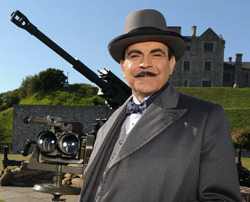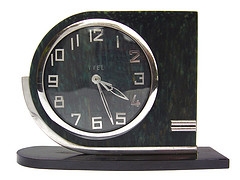
I’ll admit I haven’t done this before. I usually let the series stand alone, and it never disappoints, even when I know it’s “based on”—and not a faithful dramatization of—the novel. It turns out that The Clocks was an interesting book to choose for this experiment because it differs quite dramatically from the TV episode. In fact—has this ever happened to you?—from the first frame of the opening scene I was convinced I’d been reading the wrong book!
The entire pre-World War II German espionage plot that occupies a substantial part of the TV episode simply doesn’t exist in the novel. And with good reason: Agatha Christie wrote The Clocks in the 1960s and it was set in the present day, which meant that if people in the book were preoccupied with espionage of any kind (and they were) it was bound to involve Communists and not Nazis.

But Dover Castle? That didn’t figure into the book at all.
It was at this point that I realized comparing the book and the TV episode would be fruitless. For each to be true to its time, it had to be distinctive. And so I now had not one but two mysteries to pursue, and each has its advantages.
Both center on a typist who discovers the body of a dead man in the sitting room of a blind woman’s house. The typist is Sheila Webb. The blind woman is Miss Pebmarsh. And the dead man is… well, that’s part of the mystery and we’ll have no spoilers here.
Poirot plays a notably larger role in the show than in the book. No surprise there, David Suchet is a national treasure and now he has the CBE to prove it.
On the other hand, the book is filled with Poirot’s wonderful commentary and opinions on the works of crime novelists from Arthur Conan Doyle to John Dickson Carr to Christie’s fictional alter ego Ariadne Oliver. It also has a delectable homage to Alfred Hitchcock’s 1954 film Rear Window, and it’s infused with Christie’s sly humor (both absent from the TV episode).
With all due respect to Dame Agatha, the TV episode ties up some plot points in a way that is more definitive and easier to understand than the book does. Yet the final twist in the book (not in the TV show) was one of my favorite parts of the story, not least because I felt extremely clever for predicting it earlier on.
Then, there were the differences that seemed arbitrary. Why, for instance, was the typist who notices an inconsistency in the account of the murder named Edna in the book and Nora in the TV show? And why is Colin’s name changed from Lamb in the book to Race on TV? More mystery perhaps.

Yet, Poirot is timeless, and that is his allure. Leave him in the 1960s or take him back to the 1930s, he remains the world’s greatest detective, and I’ll follow him wherever he chooses to lead, even through time.
Leslie Gilbert Elman blogs intermittently at My Life in Laundry. She’s written two trivia books and has a few unpublished fiction manuscripts in the closet to keep the skeletons company.

Thanks for posting with no spoilers. [u]The Clocks[/u] was the first Agatha Christie book I read (after I’d been watching Poirot mysteries on A&E). I no longer remember the whodunit or howdunit.
Unfortunately I won’t be able to watch this episode until next week (as I was unable to tape it Sunday due to other things taping and there being no replay locally until early Sunday morning). Also, I still have last week’s to watch. I wouldn’t be surprised if my wife and I end up having a Poirot marathon in a month or two and watching all of them over one weekend.
You’ll get no spoilers from me!
Actually, the great thing about the passage of time is that I no longer remember most of the whos whodunit so every time I reread a novel or see an old episode of Masterpiece Mystery it’s like I’m experiencing it for the first time. (Kidding…sort of.)
Do reread The Clocks after you watch the episode. I’d be interested to learn which bits you liked best from each.